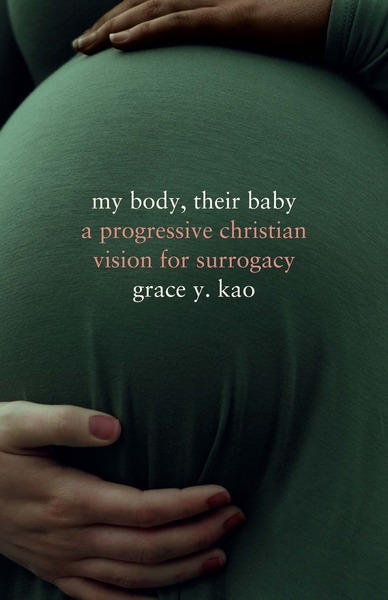
“My Body, Their Baby: A Progressive Christian Vision for Surrogacy”
Grace Y. Kao
Nearly four decades after the In re Baby M case stimulated widespread debate in the United States, the legal and religious debates over surrogacy continue. Surrogacy laws in the U.S. vary widely by state, and Pope Francis recently made international headlines by calling for a global ban surrogacy. Into this ongoing debate comes the important new book by Grace Kao, making a progressive Christian case for surrogacy based on several principles, including the feminist valuing of lived experience, the importance of safeguarding reproductive autonomy, and the co-existence of altruism and self-love. We are grateful to Professor Kao and Stanford University Press for allowing us to publish this excerpt from a book that is sure to invite and inform further conversation at the intersection of law and religion.
– M. Christian Green
The following excerpt is from Chapter 6 of My Body, Their Baby: A Progressive Christian Vision for Surrogacy, by Grace Y. Kao, published by Stanford University Press, ©2023. All rights reserved.
Assessing the Ethics of More Complex Surrogacy Arrangements
When I was carrying a baby for my involuntarily childless friends, many well-wishers commended me for my selfless act—for manifesting “love and life” as our Methodist clergy friend put it during his prayer before the meal at Katie and Steven’s grand baby shower. Some fellow ethicists conveyed…that my surrogacy was for them a quintessential act of supererogation. While I have appreciated those affirmations, they have also made me uncomfortable. Yes, my actions went beyond the call of duty, but pregnancy has never been onerous for me, parting with the baby at journey’s end was an emotionally satisfying (not distressing) affair, and I suffered no career set-backs through it all….
Physically speaking, to be clear, I’m not someone who just loves being pregnant. I knew if I were to help my friends I would be inconvenienced by things like first trimester fatigue, swollen feet, and nights of interrupted sleep in the third trimester. But I also anticipated reveling in other bodily changes, my favorite being that second trimester energy surge. Pregnancy is just something my body inexplicably does well. I’d never had any difficulty conceiving when my husband and I felt we were ready for kids, nor suffered a reproductive loss. I’d never once felt nauseated from being “with child,” much less vomited from it. I did experience a novel kind of all-encompassing pain from labor contractions, but still not any preterm or other harrowing labor or delivery complications…. Even on the vanity front, I’d never developed stretch marks nor gained weight I couldn’t eventually shed post-childbirth. Both my husband and I thus believed a third pregnancy for Katie and Steven would be relatively easy apart from the unknown of how I would handle the IVF, the sacrifice of mandated abstinence from the start of IVF injectables to a confirmation of pregnancy…, and the time I would need to spend at doctor’s appointments.
It turns out we were right. This higher risk pregnancy even at my then-age of forty was largely no big deal for me on a day-to- day basis, though there were difficult parts of our journey. It was also gratifying for me to give the baby back—and I also knew from the start I would not experience any remorse about it. When friends and other conversation partners have pressed me to account for how I could have been so confident of my future emotional state, I have told them I was sure any third pregnancy would resemble my first two in one other crucial area.

For reasons unbeknownst to me, I never bonded with either of my own children while carrying them in utero. Don’t get me wrong: I was brimming with excitement when expecting…[but] felt something more akin to shock and wonder than instant love for this tiny being when he first emerged outside of my body…. It was then only through caring for him around the clock and becoming acquainted with his wants and needs over several weeks when I developed what I would categorize as maternal feelings. Even so, as the due date for my second baby approached two years later, I was genuinely unsure whether I would have the capacity to love another little one as fiercely as I had come to love my first—would my heart be large enough to accommodate them both? The answer was ultimately yes, but I only knew that to be true in the days and weeks after my second son made his debut.
Given my past two pregnancy experiences, our lack of desire to have a third child, and our joint wish to help our friends become first-time parents, we were certain I would not have to do any psychological work to stay detached…because there would never be any danger of my attaching to their baby to begin with. When one of the embryos successfully “stuck” after our second transfer attempt, I felt both elation and tremendous responsibility for this nascent life growing inside of me. As the weeks progressed, I became even more vigilant about my diet, exercise, and rest than I had been when carrying my own kids due to my consciousness about my “geriatric” pregnancy and my hopes for the prenatal period to go well for all of our sakes. I also celebrated reaching various pregnancy milestones and enjoyed having my IPs and my own young kids feel with their own hands and see with their own eyes the baby kick and flutter about post-quickening. But none of these feelings of heightened responsibility and anticipation ever transformed into those of maternal love.
All told, I had calculated it would not be too costly—physically, emotionally, or professionally—for me to give this gift to my friends. But as our surrogacy was an altruistic, independent, and gestational arrangement in California—a gift between friends who were even members of the same Christian small group—it was not immediately clear how our journey might be relevant to the surrogacies of others arranged in notably different ways. What of reproductive collaborations remunerated above and beyond expenses where the members would be previously strangers to one another? Or of cross-border partnerships often involving more legal maneuvering and usually greater wealth disparities between the parent hopefuls and any person they would hire to help them? Or what if the surro-mom would… ultimately [be] parting with her own flesh and blood because she had also granted the intended parents the use of her eggs? How might my progressive vision and framework for surrogacy handle these more complex scenarios?
Defending the Good of Compensated Surrogacies When Structured Ethically
In responding to charges that commercial surrogacy is exploitative, commodifying, and especially dangerous for poor women of color, I begin with two concessions. The first is that compensated surrogacies between persons who were previously strangers does create conditions not normally present in altruistic or unremunerated surrogacies between family members or friends. The offering of financial inducements by a comparatively wealthier couple might entice the person they were hoping to commission to enter into an arrangement with known risks they might otherwise not have undertaken, with the lure of economic gain leading them to dismiss or minimize the real medical, social, and/or emotional costs of a pregnancy for others…. Thus, the greater need any person or their family has for money…, the more likely they will agree to do something as unconventional and socially stigmatizing in some quarters as what radical feminists have derisively called a “contract pregnancy” to improve their economic situation….
The second concession…is that we cannot conclusively verify or put to rest the public’s fears that surrogacy perpetuates racial inequities or exacerbates racial tensions. This is because there are no federal or international reporting requirements about the racial or socioeconomic status of the adults involved, fertility clinics only selectively self-report the demographics of their clients, and many “indy” arrangements are formed outside of any third-party mediation
The Good of Offering Surrogate Compensation:
The Co-existence of Altruism with Self-Love
One key reason why surrogate compensation is not in principle morally objectionable is my feminist Christian understanding that one can simultaneously seek to assist others and serve oneself in the process. Not only do the women across the world who undertake pregnancies for others often report a mixture of self-and other-regarding motives (a point I shall elaborate upon below), but there is no reason to believe the presence of self-interest in accepting compensation invariably taints the beauty of their offering an intimate form of hospitality to others. We accept, for instance, the comingling of other-regard and self-regard in other lines of work: for instance, most people believe that good public school teachers should be paid a decent wage and that they might have selected teaching as their profession because they enjoy working with children, educating others about their subject, and/or empowering next generations Most people in our society can also accept that persons in occupations including firefighting or lifeguarding exhibit genuine concern for others and even heroism at times without believing that if they were to be paid for their efforts (which they generally are), they would no longer be motivated to come to the aid of others for reasons other than for money. Why then does a popular characterization persist that persons who would bear children for others with pay would only or primarily be doing so for profit? ♦

Grace Y. Kao is Professor of Ethics and the Sano Chair in Pacific and Asian American Theology at Claremont School of Theology. In addition to her latest book on surrogacy, she is the author of Grounding Human Rights in a Pluralist World (2011) and co-editor of Asian American Christian Ethics (2015) and of Encountering the Sacred: Feminist Reflections on Women’s Lives (2018).
Recommended Citation
Kao, Grace. “My Body, Their Baby: A Progressive Christian Vision of Surrogacy.” Canopy Forum, February 09, 2024. canopyforum.org/2024/02/09/my-body-their-baby-a-progressive-christian-vision-for-surrogacy/.

